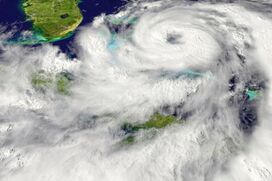
September jobs report: Hurricanes end job growth streak
Record-setting hurricanes took their toll on job growth in September.
Harvey, Irma and Maria wreak havoc on employment
In September, the devastation caused by hurricanes Harvey and Irma had a significant effect on the U.S. economy. The Bureau of Labor Statistics reported that employers let go of roughly 33,000 employees, signifying the end of a nearly seven-year growth streak.
"What happened in Florida and in Texas was devastating. I know several offices were negatively impacted as a result," says Kristen Freeman Johnson, Division Director for Beacon Hill's Associates Division in Washington, D.C. "In DC, we were asked to participate in a project, staffing a large number of customer service contractors, who helped field calls from hurricane victims for FEMA. We had a lot of interest from candidates who wanted to help and make an impact, which was inspirational to see."
BLS reported that the hurricanes had no lasting effect on the national unemployment rate, which remains steady at 4.2 percent.
In late September, the Federal Reserve raised its projections for GDP growth and lowered its expectations for the unemployment rate, two indicators that the damage to the economy is only temporary, reported CNBC. That means employees could see more job opportunities appear as the year continues.
Readers should note that the jobs report does not take into account U.S. territories such as Puerto Rico and the Virgin Islands. Nevertheless, Hurricane Maria could still negatively impact the larger U.S. economy should thousands of migrants move to the mainland.
"It will be a massive exodus [...] We're talking about 100,000 to 200,000 people," said economist Edwin Meléndez in an interview with Vox.
Those additional job seekers could intensify competition for jobs, especially along the East Coast. Many displaced Puerto Ricans might travel to Florida, Pennsylvania and New York.
Ultimately, time will tell how lasting the impact of these hurricanes will be on national employment.

Food services see major losses
Job losses were felt most heavily in the food services industry, which lost approximately 105,000 positions in September. The New York Times reported that many of the workers who were forced to stay home during the storms are likely back to work by now, which could mean an artificial spike in employment gains next month.
Nursing care facilities and the manufacturing industry saw smaller losses, shedding 9,000 and 1,000 positions, respectively.
A few industries saw marginal growth in September:
- Ambulatory health care services: 25,000 jobs added.
- Transportation: 22,000 jobs added.
- Financial activities: 10,000 jobs added.
- Insurance carriers: 11,000 jobs added.
- Business services: 13,000 jobs added.
Though not a banner month for job growth, these numbers make it clear that the recent hurricanes had the biggest effect on the economy, compared to other factors.
Moving forward to the holiday season
October typically marks the beginning of the holiday hiring season, with retail, hospitality and food services generally contributing the bulk of seasonal labor. To learn what we can expect from the upcoming months, we can turn to last year's job reports.
In October 2016, employers hired approximately 161,000 workers, and in November 178,000 people gained employment. At the time, the unemployment rate was 4.6 percent.
Hurricane season in Florida lasts until the end of November, so there's still a chance of further economic disruption. However, if past trends continue through the end of 2017, employers could more than makeup for this temporary setback.
 Back to Top
Back to Top

